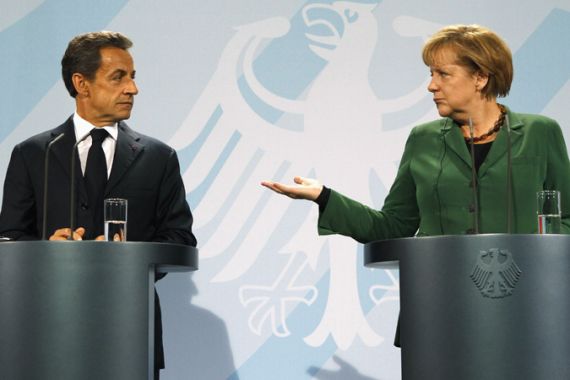Germany and France agree bank rescue plan
Announcement in Berlin comes after European leaders reach accord on strategy for dismantling troubled Dexia Bank.

Germany and France stand ready to recapitalise banks according to common criteria, German Chancellor Angela Merkel has said.
“We are not going into details today, we will present a complete package” for stabilising the eurozone at the end of the month, Merkel said at a news conference in Berlin on Sunday following a meeting with French President Nicolas Sarkozy.
Keep reading
list of 4 itemsByteDance prefers TikTok shutdown in US over sale: Report
‘We need you’: Solomon Islands’ support for US agency’s return revealed
Why are nations racing to buy weapons?
The meeting came in the face of evidence that some European banks are creaking under the strain of the mounting debt crisis which has pushed Greece to the brink of bankruptcy.
It also came hours after France, Belgium and Luxembourg agreed to a rescue plan for Dexia, that is expected to lead to the dismantling of the troubled bank.
“The governments … have reaffirmed their solidarity in finding a solution to secure the future of Dexia,” said a statement on Sunday from the office of Yves Leterme, Belgium’s caretaker prime minister.
Al Jazeera’s Nick Spicer, reporting from Berlin, said the plan is likely to be accepted by the bank’s board.
“It is pretty much a done deal,” he said.
France and Belgium became part owners of the bank during a 6bn euro ($7.8bn) bailout in 2008. Luxembourg holds a smaller stake. They have promised to ensure that no Dexia depositors lose money.
After Dexia’s shares plunged last week due to fears it could go bankrupt, the French and Belgian governments stepped in and guaranteed its financing and deposits.
Debt exposure
International Monetary Fund chief Christine Lagarde, who was the first to call for banks to be urgently recapitalised, has met both Sarkozy and Merkel in the last few days.
French banks are seen as particularly overexposed to Greek, Italian and Spanish debt. Leaders want to prevent any new, bigger reduction of Greece’s debt triggering a banking crisis reminiscent of 2008, which set off a global recession.
“We must ensure that the banks have sufficient capital” to face any possible increase in the reduction of Greece’s debt, Frankfurter Allgemeine Zeitung newspaper quoted Wolfgang Schaeuble, the German finance minister, as saying.
A planned 21 per cent “haircut” or reduction in value of the debt banks hold in an exchange for lowering Athens’ debilitating repayments in the next few years – which was agreed in July – could “perhaps” be insufficient, he added.
Germany, Europe’s strongest economy, wants under-pressure banks to first turn to investors for funds before appealing for national or European cash.
The EU’s $589bn European Financial Stability Facility (EFSF) bailout fund could intervene as a last resort “only if a country cannot do this with its own means”, Merkel said Friday.
France, fearful of losing its top-notch AAA credit rating, would rather dip into European funds than its own coffers.
The IMF estimated the eurozone debt crisis has directly cost banks in the European Union some 200bn euros in sovereign credit risk in the past two years.